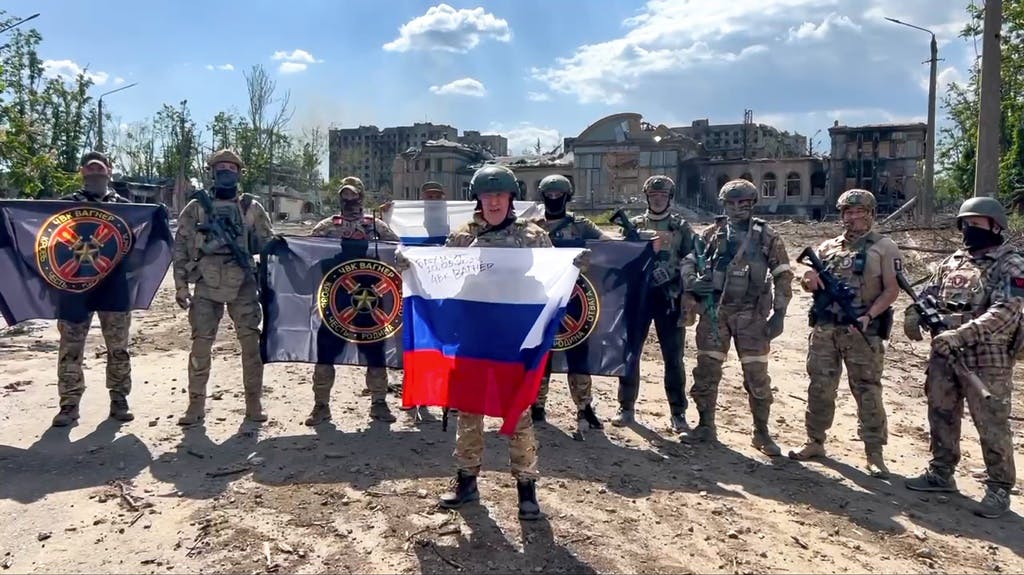Risk Posed by Mercenary Leader Prompts Belarus’s Lukashenko To Rein In Wagner Group
A group of experienced mercenaries at Lukashenko’s doorstep doesn’t bode well for Europe’s longest-serving dictator.

The Belarusian strongman, Aleksandr Lukashenko, is setting the stage for a confrontation with the Wagner group, laying down ground rules for the Russian fighters during their sojourn in his country — their new home-in-exile.
Mr. Lukashenko is eager to establish some control over the mercenary group now that Wagner’s leader, Yevgeny Prigozhin, surfaced in Belarus on Tuesday following days of uncertainty about his whereabouts in the aftermath of a failed coup attempt against President Putin over the weekend.
In Africa and the Middle East, Wagner has operated with impunity. In Ukraine, their fighting is marked by levels of incomprehensible brutality. In Belarus, Mr. Lukashenko hopes the group won’t do much of anything.
Following Wagner’s thunder run on Moscow, aborted just 120 miles outside of the Russian capital by a deal brokered by Mr. Lukashenko, the group has lost its raison d’être.
Mr. Prigozhin called off the assault on Moscow — backed by hundreds of tanks, armored vehicles, air defense weapons, and thousands of mercenaries — in exchange for a general amnesty and haven in Belarus.
“I see that Prigozhin is already flying on this plane,” Mr. Lukashenko said, according to a Belarusian state news agency, Belta. “Yes, indeed, he is in Belarus today.”
Mr. Lukashenko laid out ground rules for Wagner members’ stay in Belarus, insisting that the group will not be able to recruit more members in-country.
“Belarus is ready to help with the deployment of the Wagner PMC fighters in Belarus [to Ukraine], if necessary,” Mr. Lukashenko said. “However, this does not mean that there will be points for recruitment of PMCs in Belarus,” he added.
During last week’s turbulent events, Mr. Prigozhin claimed to have 25,000 Wagner fighters at hand during his march to Moscow. Research by outside analysts has suggested their actual number was closer to half that amount.
Regardless, a group of experienced mercenaries at Mr. Lukashenko’s doorstep doesn’t bode well for Europe’s longest-serving dictator — especially one generously financed by the Russian state.
In an extraordinary disclosure, President Putin Tuesday detailed the immense financial support Wagner received from the Russian defense ministry during the last two years. “We fully financed the group from the federal budget,” Mr. Putin said in a speech to a small group of officials, reading haltingly from a single sheet of paper.
“Just from May 2022 until May 2023,” Mr. Putin explained, “the [Russian] state paid Wagner companies 86,262,000,000 [about $1 billion] for cash support and incentive payments.”
The information is relevant not for the number of rubles shifted from the government’s coffers to Wagner’s, but because private military companies like Wagner are officially forbidden under Russian law.
Since Russia’s full-scale invasion of Ukraine last year, Wagner recruitment centers and advertisements promising sign-on bonuses and other large cash payments have multiplied within Russia, a testament to the group’s usefulness to the Kremlin in Ukraine.
The shadowy group played a vital role for the Kremlin in the past as a politically expedient arm of the Russian state abroad and one to which the Russian defense ministry repeatedly denied it had ties.
Yet with Mr. Putin’s admission, that veneer of deniability is now wiped away, raising additional questions about Wagner’s future outside of Russia, Belarus, and Ukraine.
Wagner’s activities abroad are confirmed in parts of Africa and the Middle East, including Syria, Libya, the Central African Republic, Sudan, Mali, Mozambique, and Venezuela.
In Ukraine, Wagner forces served first as crack shock troops and as human-wave attack forces to breach Ukrainian positions, or as an easily expendable probing force used to expose weak spots in Ukrainian defenses.
Elsewhere in Africa and the Middle East, Wagner’s activities focus on resource extraction, propping up despots, training militias and paramilitary forces, and as a kind of Praetorian Guard for government officials.
Mr. Lukashenko’s reluctance to give the group unfettered freedom in Belarus stems from Wagner’s erratic behavior and potential to catalyze regime change.
Caught between Messrs. Putin and Prigozhin, Mr. Lukashenko is treading a delicate path, but left the door open for Wagner mercenaries in Belarus to fight on in Ukraine.
Mr. Lukashenko may hope Wagner uses Belarus as a home base for operations in Africa and the Middle East, or perhaps as a jumping off point for activity in Ukraine. Either way, they won’t be taking Belarusians with them.
“That’s why we don’t need to open any Wagner recruitment points. I think there will never be any,” Mr. Lukashenko explained. “And whoever wants to serve there [in Ukraine], they will find their way there.”

